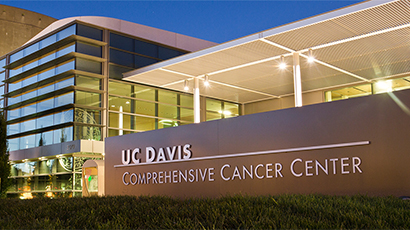Welcome to the winter issue of Synthesis, the official magazine of UC Davis Comprehensive Cancer Center. Throughout this issue, you will read about the incredible work of our teams of scientists, clinicians and staff on both sides of the Yolo Causeway, all working collaboratively to discover and deliver the latest in cancer biology, prevention, interception, diagnosis and treatment.
It has long been recognized that cancer is — at its core — a genetic disease. In this issue, we highlight the importance of genetics and genomics in understanding cancer behavior across species. As part of our partnership with UC Davis School of Veterinary Medicine, we have launched a new initiative called the Canine Tumor Genome Atlas, an effort which seeks to map the genetic makeup of tumors in companion dogs. Some cancers occurring in dogs have an uncanny resemblance to those in humans. Performing next-generation DNA sequencing of dog tumors may unlock cancer breakthroughs applicable to our pets as well as to people.
As we aim to reduce cancer disparities in our region and beyond, you’ll also read about how our new initiative focused on persistent poverty areas is helping us build connections with people in their communities to address the cancer risks they face. Those living in impoverished neighborhoods are subject to cancer death rates that are 12% higher than wealthier areas. We want to do something about that, and the National Cancer Institute funding we have received is giving our efforts a significant boost.
Within the sphere of making a difference, you’ll learn about our new commitment to understanding the cancer burden endemic in Native American communities in Northern and Central California and how we hope to build trust with Indigenous peoples. A new outreach specialist is serving as a liaison with tribal nations as we work to identify their cancer health priorities and apply the power of research to mitigate their disproportionate cancer burden.
We also invite you inside our cancer center to see how we are optimizing the patient experience by linking education, prevention and the latest diagnostics and surgical technologies to catch and treat the nation’s and our region’s No. 1 cancer killer, lung cancer, through the establishment of a new integrated service line. Our plan is to ensure that people know when they are at risk, get screened and quickly obtain help, so they have the best chance of beating this lethal cancer.
Translating therapies into clinical practice starts with research. Learn about the in-depth studies that our scientists are conducting to bring meaningful clinical benefits through development of novel agents, personalized medicine and other innovative discoveries such as nanotechnology that manipulate molecules at near-atomic scales. These discoveries have the potential to be translated into clinical care through robust interactions between our laboratory-based researchers and cancer doctors.
Finally, high-profile foundations are continuing to take notice of UC Davis Comprehensive Cancer Center and its impact in our community. The Farrah Fawcett Foundation is investing in our initiative to promote awareness of the cancer risks posed by the human papillomavirus (HPV). We are committed to supporting teens hospitalized with cancer by establishing a teen lounge — funded in part by members of the rock band The Who — where young people can connect with others and have fun. And Hyundai is giving us the means to pursue research in cancers affecting children: A generous grant from the car company will allow us to develop a robot that will take pediatric patients on virtual field trips.
Want to be a part of it all? We have creative ideas for how you can join us as we strive to make a difference. Our new managing executive director of development shares ways to make your philanthropic vision a reality.
We hope you will find this issue of Synthesis informative and stimulating. As always, thank you for your support!
Primo “Lucky” Lara Jr. M.D.
Director, UC Davis Comprehensive Cancer Center






